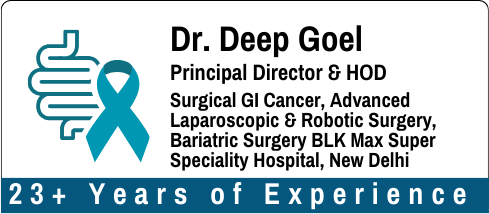Your Cancer Journey: The Role of Your Gastrointestinal Oncologist

A cancer diagnosis can turn life upside down in an instant, leaving you overwhelmed with fear, confusion, and countless questions. At such a critical time, the presence of the right doctor becomes more than just medical support; it becomes a source of guidance, reassurance, and hope.
For cancers of the digestive system, this pivotal role is played by the GI Oncologist. Far beyond simply prescribing treatments, a GI oncologist serves as a navigator, counselor, and advocate, helping you navigate every stage of your cancer journey with clarity and confidence.
In this blog, we’ll explore why the role of a GI oncologist is so vital, how they differ from other cancer specialists, and how renowned experts are reshaping the landscape of cancer care with their expertise and compassionate approach.
Who is a GI Oncologist?
A GI Oncologist (Gastrointestinal Oncologist) is a cancer specialist who focuses exclusively on cancers of the digestive system, including:
- Esophagus
- Stomach
- Colon and rectum
- Pancreas
- Liver
- Gallbladder and bile ducts
Unlike general oncologists, a GI oncologist has advanced expertise in diagnosing and treating these cancers, which often require highly specialised knowledge and treatment strategies.
Dr. Deep Goel explains, “Gastrointestinal cancers are complex and aggressive, but with early diagnosis and precise treatment, many patients can live long, healthy lives. My role is not only to treat the disease but to give my patients confidence and hope.”
The Role of a GI Oncologist in Your Cancer Journey
1. Accurate Cancer Diagnosis
The first and most critical step in any cancer journey is an accurate cancer diagnosis. Digestive cancers often present with vague symptoms like abdominal pain, bloating, jaundice, or weight loss. A GI oncologist uses advanced diagnostic tools, such as:
- Endoscopy, Colonoscopy, and Gastroscopy: Visualize abnormalities inside the digestive tract
- Biopsy: Analyze tissue samples under a microscope
- Imaging scans (CT, MRI, PET-CT): Determine the stage and spread of cancer
- Molecular and genetic tests: Understand the tumour’s biology
Without a precise diagnosis, effective treatment is not possible.
A patient of Dr. Deep Goel shared, “When I first met Dr. Goel, I was frightened. I had constant pain and unexplained weight loss. He explained my condition in detail, ordered the right tests, and confirmed early-stage stomach cancer. Because of his timely diagnosis, I was treated with surgery, and today I’m cancer-free.”
2. Designing Personalised Cancer Treatment
Every patient is unique, and so is every cancer. This is why personalised cancer treatment is the core principle of GI oncology. A GI oncologist tailors the plan to the stage of the disease, the patient’s health, and long-term goals.
Treatment options may include:
- Surgery – advanced laparoscopic or robotic cancer surgery for faster recovery
- Chemotherapy – systemic medicines that destroy cancer cells
- Radiotherapy – targeted radiation to shrink or control tumours
- Targeted Therapy – drugs that block cancer’s specific growth pathways
- Immunotherapy – boosting the immune system to fight cancer naturally
By combining these approaches, GI oncologists deliver holistic and effective cancer treatment designed for the individual.
Dr. Goel emphasises, “No two patients are the same. I design treatment plans based on the stage of cancer, the patient’s age, health, and their personal goals. This personalised approach ensures not just survival but a better quality of life.”
3. Coordinating Multidisciplinary Care
A single doctor rarely handles cancer care. It involves a team of surgeons, radiation specialists, nutritionists, psychologists, and rehabilitation experts. The role of a GI oncologist is to serve as the central coordinator of this team, ensuring that patients receive seamless and comprehensive care throughout their journey.
4. Providing Emotional and Supportive Care
Cancer does not just affect the body; it profoundly impacts mental and emotional health. GI oncologists recognise this and play a supportive role by:
- Counselling patients and families
- Offering guidance on nutrition and lifestyle
- Managing treatment side effects such as fatigue, nausea, or digestive issues
- Ensuring patients feel informed and empowered in their decisions
In short, they act not only as medical professionals but also as compassionate partners in the recovery process.
Another patient of Dr. Deep Goel shared, “When I was told I had colon cancer, I felt my world had collapsed. Dr. Goel not only performed my surgery but also sat with my family and reassured us every step of the way. His team provided dietary support and counselling, which helped me recover both emotionally and physically. Today, two years later, I live a normal life, and I owe it to his guidance and care.”
Why Choosing the Right Cancer Specialist Matters?
Studies consistently show that patients treated by specialists have better outcomes. A GI oncologist brings:
- Deep expertise in digestive cancers
- Access to the latest treatments like robotic surgery, targeted therapy, and immunotherapy
- Experience in complex cases such as multi-organ involvement
- Higher survival rates due to precision-driven care
Dr. Deep Goel says, “Choosing the right doctor is as important as choosing the right treatment. A specialist understands the disease at its root, and this often makes the difference between average care and the best possible outcome.”
Patient Journey with a GI Oncologist: Step by Step
Every cancer journey is unique, but with a GI oncologist by your side, the path from diagnosis to recovery becomes clear and well-guided.
- First Consultation & Diagnosis – Comprehensive evaluation and diagnostic tests
- Treatment Planning – Discussion of all options, risks, and expected outcomes
- Treatment Execution – Surgery, chemotherapy, or combination therapies tailored to the patient
- Supportive Care – Nutritional support, psychological counselling, and side-effect management
- Rehabilitation & Follow-Up – Continuous monitoring to detect recurrence and ensure long-term health
This structured journey ensures that patients feel supported at every stage.
Future of GI Oncology
The field of gastrointestinal oncology is advancing rapidly. Patients under the care of GI oncologists today benefit from:
- Precision Oncology – genetic profiling to choose the best therapy
- Next-Generation Immunotherapies – unlocking new survival possibilities
- Artificial Intelligence in Diagnostics – faster, more accurate detection
- Robotic-Assisted Surgeries – safer procedures with better outcomes
These innovations underscore why the expertise of a GI oncologist is becoming increasingly critical.
Final Thoughts
Your cancer journey may feel overwhelming, but with the right expert, it can be a path of strength, healing, and hope. The role of a GI oncologist is not just to treat cancer but to guide you through diagnosis, create a personalised treatment plan, coordinate holistic care, and provide emotional support.
With world-class specialists like Dr. Deep Goel, the best GI oncologist in New Delhi, patients receive cutting-edge care combined with compassion and reassurance.
Cancer may change your life, but with the right GI oncologist by your side, it can also mark the beginning of a stronger, more hopeful tomorrow.
FAQs for GI Oncology
1. How do I know if my stomach pain or indigestion could be cancer?
Persistent pain, bloating, or indigestion lasting weeks, especially when accompanied by weight loss or blood in the stool, should be evaluated by a GI oncologist.
2. Can lifestyle changes reduce my risk of GI cancer?
Yes. Eating a high-fibre diet, avoiding smoking and alcohol, exercising regularly, and maintaining a healthy weight lower the risk.
3. Is robotic surgery better than traditional surgery for GI cancers?
Robotic surgery offers more precision, more minor cuts, and faster recovery, but suitability depends on your case and cancer stage.
4. Is it safe for international patients to travel to India for GI cancer treatment?
Yes. India is a trusted hub for advanced, affordable cancer care with international patient support for travel, stay, and recovery.
5. How often will I need follow-ups after treatment?
Usually every 3–6 months for the first 2 years, then yearly, to monitor recurrence and manage side effects.
Explore more blogs: What Are the Latest Advancements in GI Cancer Treatment?

